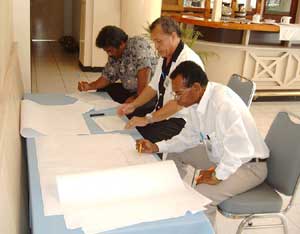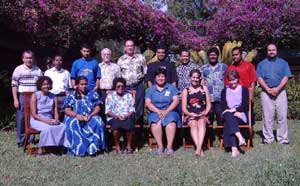UNESCO-AIBD Workshop on Sound Archives for Public Radio Stations of the Pacific
02-12-2003 ()

At work
© K.Lippe, AIBD
“An archive will not cry, it will die a silent death unless we care for it”, said one participant of the Workshop on Sound Archives for Public Radio Stations of the Pacific that was organized by UNESCO and the Asia-Pacific Institute for Broadcasting Development (AIBD) in Nadi, Fiji from 28 November to 1 December 2003.
The workshop was an eye-opener for the twelve participants from nine radio stations of the small islands of the Pacific region who came together to study appropriate methods, strategies and technologies, which will help them to preserve the resources stored in their stations’ archive. These resources will also help make the stations’ programmes more diversified and interesting.
“A lot has been said and written about what could be done to archive important sound materials. Still most broadcasting stations all over the world do little to implement this”, said AIBD sound archive specialist Karl Lippe, who was the principal trainer at the workshop. He stressed that new technology is not a solution to archiving. However, a carefully planned system will make the preservation and maintenance of archives easier.
The workshop stressed the importance of a well-planned and holistic archiving strategy. It helped the participants to determine the parts of their archives, which most require development, and to quantify a collection and its condition. The participants also learned about the technologies for conversion, storage and distribution of archive content, and looked into how to outline an appropriate workflow to make best use of the existing archive materials.
Big differences were found in the amount of material in each station’s archive, which needs to be digitized in order to preserve it for posterity. Some of the stations have a lot of historical and cultural heritage. Others will face an “easier” task with “only” 1-2,000 hours of material to convert from analogue to digital.
“Technically speaking one of the greatest challenges for the archivists and the IT-specialists of the station is the decision on which audio documents to preserve in their full quality and which to compress or reduce”, Wilfried Solbach, AIBD’s radio trainer said. “This has a direct influence on the total cost of the digital archival process as unreduced material needs a lot more resources and increases the overall costs.”
A digital archive in a radio environment makes sense only when the material can be easily accessed by journalists and producers to be used in their programmes. At its best, a digital archive, therefore, is a networked to the overall digital production and transmission environment. Various networking approaches and related changes in the workflow were also discussed during the workshop.
Everyone agreed that a station’s cultural heritage can be preserved only if there is a permanent commitment and dedication to the maintenance and preservation of the archives. “The support must come from the management, the decision-makers and the whole society. External aid cannot bring a permanent solution to a radio archive”, was the message.
The workshop was part of UNESCO’s programme in support of media development in the Pacific Islands region.
“A lot has been said and written about what could be done to archive important sound materials. Still most broadcasting stations all over the world do little to implement this”, said AIBD sound archive specialist Karl Lippe, who was the principal trainer at the workshop. He stressed that new technology is not a solution to archiving. However, a carefully planned system will make the preservation and maintenance of archives easier.
The workshop stressed the importance of a well-planned and holistic archiving strategy. It helped the participants to determine the parts of their archives, which most require development, and to quantify a collection and its condition. The participants also learned about the technologies for conversion, storage and distribution of archive content, and looked into how to outline an appropriate workflow to make best use of the existing archive materials.
Big differences were found in the amount of material in each station’s archive, which needs to be digitized in order to preserve it for posterity. Some of the stations have a lot of historical and cultural heritage. Others will face an “easier” task with “only” 1-2,000 hours of material to convert from analogue to digital.
“Technically speaking one of the greatest challenges for the archivists and the IT-specialists of the station is the decision on which audio documents to preserve in their full quality and which to compress or reduce”, Wilfried Solbach, AIBD’s radio trainer said. “This has a direct influence on the total cost of the digital archival process as unreduced material needs a lot more resources and increases the overall costs.”
A digital archive in a radio environment makes sense only when the material can be easily accessed by journalists and producers to be used in their programmes. At its best, a digital archive, therefore, is a networked to the overall digital production and transmission environment. Various networking approaches and related changes in the workflow were also discussed during the workshop.
Everyone agreed that a station’s cultural heritage can be preserved only if there is a permanent commitment and dedication to the maintenance and preservation of the archives. “The support must come from the management, the decision-makers and the whole society. External aid cannot bring a permanent solution to a radio archive”, was the message.
The workshop was part of UNESCO’s programme in support of media development in the Pacific Islands region.
 Workshop participants
Workshop participants© K.Lippe, AIBD
Related themes/countries
· Memory of the World: News archives 2003
· 2003
· Fiji: News Archive 2003
Share this story:
Contact information
- UNESCO New Delhi
Source














